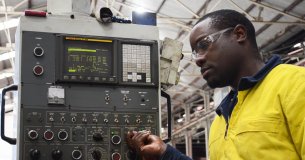-
Featured Items
-
Featured Resources
 Funding & Grants
Don't miss out on funding opportunities. Stay informed with our up to date online listings and email notifications.
Read More
Funding & Grants
Don't miss out on funding opportunities. Stay informed with our up to date online listings and email notifications.
Read More
 Skilled Migration
Our services help both applicants and employers, to learn more, develop plans, submit applications, and settle in.
Read More
Skilled Migration
Our services help both applicants and employers, to learn more, develop plans, submit applications, and settle in.
Read More
 Research and Analysis
Good research and analysis makes the case. How can our resources and services help your project or application?
Read More
Research and Analysis
Good research and analysis makes the case. How can our resources and services help your project or application?
Read More
 Information & Data Resources
With resources like REMPLAN, Regional Knowledge Base, and decades of data, discover how we can help your project.
Read More
Information & Data Resources
With resources like REMPLAN, Regional Knowledge Base, and decades of data, discover how we can help your project.
Read More
-
Stay InformedSubscribe to one or more of our regular email subscriptions, to be kept up to date on news and funding opportunities for the region
-
-
Our Region
- Our Region
- Regional Plan
- Regional Data
- Current Regional Issues
- Population Migration Analysis for 2016-21
- Job Vacancies Continue at All-Time High
- National Debt - What it Means for Our Economy?
- The True Value of Home Solar
- The Economic Impacts of Local Government Amalgamations
- State of the Regions Report 2014-15
- Antifragility - A different take on regional economic development
- Biohubs - Collaborative Waste Management
- Attracting New Residents
- Socio-Economic Impacts of the Murray Darling Basin Plan
- Murray Darling Basin Water Recovery
- Growing Businesses
- The Northern Inland Economy
- Geographical Overview
- Major Industry Sections
- Our Services
- Grants and Funding
-
Skilled Migration
- Skilled Migration
- Skilled Employer Sponsored Regional Visa
- Skilled Work Regional Visa (subclass 491)
- Temporary Seasonal Workers
- Designated Area Migration Agreement (DAMA)
- Helpful Information for Visa Holders
- Information for Employers
- Case Studies
- Payment Details
- Advice & Further Information
- Contact Details
- News & Events
-
Our Projects
- Our Projects
- Current Projects
- Skilled Migration
- Wool Works - Wool Training Schools
- Metal Works - Welding and Fabrication Schools
- Come On Inland
- Stories of Resilience
- Alt Brothers Beekeeping - Glen Innes
- Carelle's Toy Store - Glen Innes
- Greenhill Orchards - Arding
- Gwydir Meats - Warialda
- Kaputar Motors - Narrabri
- Moonbi General Store - Moonbi
- Sandstock - Tingha
- Sherelle Fashions - Tenterfield
- Sleepy Merino - Inverell
- Tenterfield Chamber of Toursim, Industry and Business - Tenterfeild
- The Welders Dog - Armidale
- Walcha Veterinary Supplies - Walcha
- AGCAP - Agribusiness Careers & Professions
- Northern Inland Regional Investment Profile
- Past Projects
- Digital Economy Strategy
- Business Growth Project
- Go Digital
- How to Start an Online Business
- Create Your Website Using Squarespace
- How to Edit Your Squarespace Site - Part 1
- How to Edit Your Squarespace Site Part 2
- Add a Shop to Your Squarespace Site
- Start a Blog and Find out What Customers are Searching
- 14 Tips For a Better Blog Post
- Which Social Media Platforms are Best for Your Business
- How to Use Facebook Effectively For Your Business – Part 1
- How to Use Facebook Effectively For Your Business – Part 2
- Instagram Tips for Business
- Catching Up, More Instagram & Dealing with Haters
- Getting Started with Twitter for Business
- Social Media Scheduling Tools
- How to Start an Etsy Shop – Part 1 – Research
- How to Start an Etsy Shop – Part 2 – Signup
- Online Security for Your Business
- Product Photography and Website Images: Your Guide
- 5 Tips to Improve your Productivity in your Business
- Best Online Business Resources
- How to Improve Your Communication Skills and Win More Clients
- NBN Coordinator
- Putting Power Back in the Regions
- Road Freight Study
- Town Audit Benchmarks
- Food and Wine
- Youth Survey
- Digital TV Switchover Assistance
- Northern Inland Transport Guide
- Live.Train.Work
- Northern Inland Innovation Awards
- Northern Inland Innovation Awards - 2017
- Northern Inland Innovation Awards - 2016
- Northern Inland Innovation Awards - 2015
- Northern Inland Innovation Awards - 2014
- Northern Inland Innovation Awards - 2013
- Northern Inland Innovation Awards - 2012
- Norther Inland Innovation Awards - 2011
- Prime Super Northern Inland Innovation Awards - 2010
- Prime Super Northern Inland Innovation Awards - 2009
- Northern Inland Innovation Awards - 2007
- Northern Lights Project
- NBN Smart Home
- Murray Darling Basin
- Moree Plains Business Workshops
- Namoi Investment Prospectus
- Industrial Land
- Bioenergy and Local Electricity Retailing
- Northern Inland Business Energy Assessment
- Skills for the Future
- Impacts of COVID-19 on Businesses
- Past Projects of NIRDB
- Aboriginal Employment and Enterprise in the Gunnedah Region
- Art as an Industry
- Aviation Survey
- Farm Forestry - Northern Inland Forestry Investment Group
- New England North West Film Strategy
- Northern Inland Excellence in Business Awards
- Food and Wine 2003 - 2008
- Prime Super Northern Inland Innovation Awards 2009
- Regional Business Networking Program
- Regional Leadership Course 2008
- Viticulture Strategy 2002-2003
- About Us
- Contact Us
- Other Resources
- Privacy and Legal
- Search
Search Grants & Funding
Showing Results 121 to 135, of 165 Found
Sort By
 Local Government Road Safety Program
Grant
Closes: Ongoing
Value: Unspecified
Run By: Transport for NSW
Further Information: https://roads-waterways.transport.nsw.gov.au/business-industry/partners-suppliers/lgr/grant-programs/local-government-road-safety-program.html
Local Government Road Safety Program
Grant
Closes: Ongoing
Value: Unspecified
Run By: Transport for NSW
Further Information: https://roads-waterways.transport.nsw.gov.au/business-industry/partners-suppliers/lgr/grant-programs/local-government-road-safety-program.html
Transport for NSW (TfNSW) works in partnership with local councils to co-fund Safety Officer (RSO) positions and contribute funding to LGRSP projects targeting road safety issues at a local level.
The objectives of the LGRSP are:
- Raise the profile of road safety within local government areas (LGAs)
- Create a road safety culture within the local community
- Consult with internal council stakeholders, in particular through the Local Traffic Committee and relevant local businesses, other government agencies and community organisations, which is integral to the delivery of effective road safety initiatives.
- Deliver regional, state and national road safety initiatives within the local context
- Develop, implement and evaluate evidence-based projects aimed at influencing behaviour to improve road safety in local communities
- Promote, encourage and support the adoption the ‘Safe System’ approach to road safety and integrate this within the strategic planning framework for local councils i.e work with engineers to promote safe system initiatives and treatments
- Facilitate the involvement of local businesses, other government agencies and community groups/clubs in community road safety
Co-funding is available for approved councils to:
- Employ an RSO (see Section 6) whose tasks will include applying for road safety project funding (up to the amount approved by TfNSW)
- Support road safety projects (see Section 5) to address identified road safety issues in the LGA (up to the amount approved by TfNSW).
The Local Government Road Safety Program provides:
- Professional support for local councils to address local road safety issues
- Funding to support a dedicated behavioural road safety role to your LGA
- Project funding for behavioural and safer system road safety projects
Councils choosing not to employ an RSO can apply for road safety project funding of up to 50 per cent of the cost of the project. This could include a HR component for the cost of personnel to plan and deliver the project.
 Startup Travel Stipend
Grant
Closes: Ongoing
Value: Up to $2,000
Run By: NSW Government
Further Information: https://www.nsw.gov.au/business-and-economy/support-for-startups
Startup Travel Stipend
Grant
Closes: Ongoing
Value: Up to $2,000
Run By: NSW Government
Further Information: https://www.nsw.gov.au/business-and-economy/support-for-startups
Regional recipients of the Minimum Viable Product grant can now claim up to $2000 to help them travel for an innovation-related purpose.
The stipend removes cost barriers that would otherwise prevent an early-stage startup from participating in innovation-related meetings, programs or events at the Sydney Startup Hub launch or run through the Local Innovation Network.
This helps to ensure regional entrepreneurs can access the full benefits of the NSW Government’s investment in creating sustainable innovation communities.
 Coopers Foundation - General Giving
Grant
Closes: Ongoing
Value: Up to $30,000
Run By: Coopers Foundation
Further Information: https://coopers.com.au/foundation
Coopers Foundation - General Giving
Grant
Closes: Ongoing
Value: Up to $30,000
Run By: Coopers Foundation
Further Information: https://coopers.com.au/foundation
The Foundation aims to improve and protect the quality of life of Australians by providing support to charitable organisations with recognised strengths in medical research and health care, in youth education, and aged care, and in fostering family and community support, based on Christian values.
The project must fit one of the Foundation's focus areas;
Medical research and health care
Youth education
Aged care
Fostering family and community support through Christian organisations
The Foundation accepts grant applications from Australian organisations that;
- Are registered as a charity with the Australian Charities and Not-for-profits Commission (ACNC)
- Have Deductible Gift Recipient (DGR) Item 1 endorsement by the Australian Tax Office
- Reported an annual income under $5M in the previous financial year
 Capacity Building for Native Title Corporations
Grant
Closes: Ongoing
Value: Up to $750,000 on average
Run By: National Indigenous Australians Agency
Further Information: https://www.niaa.gov.au/indigenous-affairs/grants-and-funding/capacity-building-native-title-corporations
Capacity Building for Native Title Corporations
Grant
Closes: Ongoing
Value: Up to $750,000 on average
Run By: National Indigenous Australians Agency
Further Information: https://www.niaa.gov.au/indigenous-affairs/grants-and-funding/capacity-building-native-title-corporations
Indigenous Advancement Strategy (IAS) funding, called ‘PBC Capacity Building grant funding’, is available to assist native title holding corporations, known as Prescribed Bodies Corporate (PBCs), to generate economic benefits through the effective and sustainable management of their land.
This funding is designed to build the capacity of PBCs, also known as Registered Native Title Bodies Corporate (RNTBCs).
This grant is open to all PBCs and to third parties working with the PBC sector across Australia. Applications will be considered throughout the year – there is no closing date.
Applications must be completed online and will be accepted from individual PBCs, groups of PBCs, or third parties (such as native title representative bodies and service providers, law firms, and interest groups). These third parties can apply to receive and administer funding on behalf of PBCs.
The funding has three elements:
- Direct support to increase the capacity of PBCs to take advantage of economic opportunities;
- Support for training to build long-term organisational capacity within PBCs, such as projects to amend a PBCs rulebook and governance structure, receive training or obtain professional expertise (for example, business consultancies, accountancy or legal services); and
- Direct support for effective native title agreement-making.
It is anticipated that most grants will be between $50,000-$750,000, depending on the scope of the grant activity and its complexity. There is no maximum grant amount but grants cannot exceed the amount of available funds. The Agency may award grants as one-off payments, or on a single year or multi-year basis at its discretion.
 Small-scale Renewable Energy Scheme
Grant
Closes: Ongoing
Run By: Australian Government Clean Energy Regulator
Further Information: http://www.cleanenergyregulator.gov.au/RET/About-the-Renewable-Energy-Target/How-the-scheme-works/Small-scale-Renewable-Energy-Scheme
Small-scale Renewable Energy Scheme
Grant
Closes: Ongoing
Run By: Australian Government Clean Energy Regulator
Further Information: http://www.cleanenergyregulator.gov.au/RET/About-the-Renewable-Energy-Target/How-the-scheme-works/Small-scale-Renewable-Energy-Scheme
The Small-scale Renewable Energy Scheme creates a financial incentive for individuals and small businesses to instal eligible small-scale renewable energy systems such as solar panel systems, small-scale wind systems, small-scale hydro systems, solar water heaters and air source heat pumps. It does this through the creation of small-scale technology certificates which Renewable Energy Target liable entities have a legal obligation to buy and surrender to the Clean Energy Regulator on a quarterly basis.Small-scale technology certificates are provided 'up front' for the systems' expected power generation over a 15 year period or, from 2017, from the installation year until 2030 when the scheme ends. This renewable electricity replaces electricity generated from non-renewable sources. Generally, householders who purchase these systems assign the right to create their certificates to an agent in return for a lower purchase price. The level of this benefit differs across the country depending on the level of solar energy.
Small-scale technology certificates can be created following the installation of an eligible system, and are calculated based on the amount of electricity a system produces or replaces (that is, electricity from non-renewable sources).
The number of small-scale technology certificates required to be submitted by electricity retailers is set each year by the small-scale technology percentage.
System eligibility
Under the Small-scale Renewable Energy Scheme, eligible small-scale renewable energy systems may be entitled to small-scale technology certificates, which can be sold to recoup a portion of the cost of purchasing and installing the system.
 Conservation Partners Grant
Grant
Closes: Ongoing
Value: Up to $15,000
Run By: NSW Government Biodiversity Conservation Trust
Further Information: https://www.bct.nsw.gov.au/cards/apply-conservation-partners-grant
Conservation Partners Grant
Grant
Closes: Ongoing
Value: Up to $15,000
Run By: NSW Government Biodiversity Conservation Trust
Further Information: https://www.bct.nsw.gov.au/cards/apply-conservation-partners-grant
Conservation partners grants provide financial assistance to landholders in managing their conservation area, allowing them to improve the biodiversity value of their properties.
Landholders with an agreement with the BCT who do not receive annual conservation management payments can generally apply at any time for a conservation partners grant.
Landholders participating in the Humane Society International’s (HSI) Wildlife Land Trust are also eligible for grants from the BCT.
You can apply for a grant from the BCT if you have one of the following NSW private land conservation agreements:
- unfunded conservation agreement
- trust agreement
- registered property agreement
- wildlife refuge or wildlife refuge agreement
- participation in the Humane Society International’s (HSI) Wildlife Land Trust program.
The following activities are eligible:
- assisted regeneration and weed control (as part of assisted regeneration strategy)
- fencing to secure conservation area, control grazing from livestock, to enable restoration of native vegetation
- introduced pest animal control
- revegetation (including supplementary planting)
- habitat restoration—such as installation of nest boxes and artificial hollows, or additional ground cover layer and habitat structure
- Saving our Species management actions
- other maintenance—such as repairs to existing feature required to maintain conservation values
- native vegetation restoration planning to guide assisted regeneration or revegetation
- project / grant management by third party(s)
In some cases we may arrange to visit you on your property to assess eligibility and proceed with your application. During these visits, you can ask the BCT staff member any questions you have about your agreement and the activities you want to undertake.
There are three levels of funding available:
- Up to $15,000 per year for up to three years for landholders with in-perpetuity conservation agreements, Trust Agreements, Registered Property Agreements.
- Up to $8,000 per year for up to three years for landholders with a term Registered Property Agreement.
- Up to $2,000 per year for up to three years for landholders with a wildlife refuge or wildlife refuge agreement or who are members of Wildlife Land Trust.
Applications will be funded if they are eligible, complete and meet the assessment criteria, and if the BCT has available funding. Works already completed or funded from another source will not be eligible for a grant.
 Seniors Energy Rebate
Grant
Closes: Ongoing
Value: Up to $200
Run By: Service NSW
Further Information: https://www.service.nsw.gov.au/transaction/apply-seniors-energy-rebate
Seniors Energy Rebate
Grant
Closes: Ongoing
Value: Up to $200
Run By: Service NSW
Further Information: https://www.service.nsw.gov.au/transaction/apply-seniors-energy-rebate
The NSW Seniors Energy Rebate is available for eligible self-funded retirees to help cover the cost of their electricity. Gas accounts are not included.
To be eligible you must:
- be a self-funded retiree living in NSW
- hold a current Commonwealth Seniors Health Card (CSHC) issued by either Services Australia or the Department of Veterans' Affairs
- be the account holder named on the electricity bill
- be applying for the rebate for your main place of residence.
 Natural Disaster Donated Fodder Transport Subsidy
Grant
Closes: Ongoing
Value: Transport costs up to 1,500km
Run By: Rural Assistance Authority
Further Information: https://www.raa.nsw.gov.au/disaster-assistance/natural-disaster-donated-fodder-transport-subsidy
Natural Disaster Donated Fodder Transport Subsidy
Grant
Closes: Ongoing
Value: Transport costs up to 1,500km
Run By: Rural Assistance Authority
Further Information: https://www.raa.nsw.gov.au/disaster-assistance/natural-disaster-donated-fodder-transport-subsidy
This program provides funding assistance to organisations that donate and transport donated fodder to a central location within NSW for the benefit of three or more primary producers with livestock, in the event of a natural disaster. This contributes to an outcome of quicker recovery from natural disaster.
The scheme will pay for the costs of donating and transporting donated fodder to affected properties or storage facilities in a central location up to a maximum of distance of 1,500 kilometres.
Eligibility:
- The subsidy on transport of donated fodder is available to organisations* that donate and transport donated fodder for the benefit of three or more primary producers, whose property has been affected by a natural disaster.
- Pre-approval for the transport of the donated fodder must be obtained from the NSW Rural Assistance Authority (RAA) by the organisation including agreement on estimates for the amount of fodder to be transported, the number of trips to be completed and the total distance to be travelled.
- The donated fodder must be delivered to a central location within the declared natural disaster area.
- The central location receiving donated fodder must be in an area of NSW that has been declared a Natural Disaster.
- Payment of any assistance can only occur upon production of tax invoices for expenses incurred.
- Payment of any assistance is contingent on recipients acknowledging this financial support in annual reports, media releases, digital and printed materials, web pages and online documents, advertising, plaques and signs.
- Claims must be made within three months of the RAA's approval to the transport of the donated fodder.
- As part of the application process, the applicant must agree to relevant details from the proposed application being provided to the regional Rural Financial Counsellor, Rural Resilience Officers or other co-ordinating entity so as to promote coordination of effort
Exclusions:
- Small volumes of fodder (i.e. under one tonne per load).
- Poor quality fodder, including fodder found to include weeds or other invasive species. The RAA must refuse to approve movements from regions with known or suspected biosecurity concerns. Under the Biosecurity Act 2015, the RAA cannot approve movements that present a known biosecurity risk
- In circumstances where the RAA receives notification of poor quality fodder, or fodder with weeds or other invasive species, the RAA is required to report this to NSW Biosecurity. Application and claims from organisations involved will be put on hold until a review of the operator’s movements can be completed.
- Transport of donated fodder from individual donors to individual farmers.
- Transport of donated fodder to commercial feedlots and/or feed processors.
 Off-farm Efficiency Program
Grant
Closes: Ongoing
Value: Unspecified
Run By: NSW Deptartment of Planning & Environment - Water
Further Information: https://water.dpie.nsw.gov.au/our-work/water-infrastructure-nsw/grants-and-funding/off-farm-efficiency-program
Off-farm Efficiency Program
Grant
Closes: Ongoing
Value: Unspecified
Run By: NSW Deptartment of Planning & Environment - Water
Further Information: https://water.dpie.nsw.gov.au/our-work/water-infrastructure-nsw/grants-and-funding/off-farm-efficiency-program
The Australian Government and the governments of NSW, South Australia, Queensland and ACT have agreed to extend the 30 June 2024 delivery deadline to return the 450 GL of water to the environment under the Murray Darling Basin Plan to 31 December 2027.
The Australian Government’s Off-farm Efficiency Program is a $1.54 billion initiative to upgrade water infrastructure to reduce water losses and increase water available for the environment. The program has three streams including $1.33 billion for state-led projects (open) and $150 million for grants provided direct to applicants (now closed). A further $60 million is available for on-farm projects, however NSW Government will not progress applications under this stream.
Projects funded under the program will provide long-term benefits through improved water infrastructure and reduced water losses. Water users and the community will also benefit from increased water reliability and the creation of job opportunities.
The program aims to:
- improve and modernise water delivery systems and reduce water losses to increase the volume of available water for the environment, irrigation, urban and industrial networks, irrigators and communities
- drive employment and create infrastructure opportunities for local communities through funding arrangements for suitable projects
- deliver on the NSW Government’s commitment to the Murray Darling Basin Plan to contribute to the return of 450 GL to the environment by June 2024.
The program is open to individuals and entities in the irrigation, urban and manufacturing sectors across the Murray Darling Basin for projects that will achieve water efficiencies and return water to the environment.
The following types of projects are eligible to apply for funding under the program:
- Irrigation networks: installing new, or upgrading existing, irrigation infrastructure and technology in water delivery networks to supply water to irrigators, including permanently decommissioning inefficient or underused sections of a water delivery network
- Industrial or mining: constructing, replacing, upgrading, installing, improving, or refurbishing industrial water uses, including reducing leakage, for the purpose of using water for producing goods and services
- Urban: constructing, replacing, upgrading, installing, improving, or refurbishing urban water supply arrangements, including reducing leakage for the purpose of urban water supply
- Stock and domestic: improving stock and domestic water supply on one or more properties for the purpose of watering stock and supplying water for human use.
Feasibility funding is available to help identify early project opportunities to reduce water losses and increase water available for the environment in the Murray-Darling Basin. This can include investigations into improving infrastructure, confirming water losses and savings, informing the potential costs of construction, and supporting formal discussions with stakeholders.
Some on-property projects are eligible such as the installation or replacement of pipes, tanks and troughs for stock and domestic systems These are considered ‘off-farm’ activities as stock and domestic water entitlements are not tradeable and do not impact the water market. Individuals or organisations proposing on-property stock and domestic projects to improve water delivery and reduce water losses are encouraged to contact winsw.programs@dpie.nsw.gov.au for more information.
 High-Risk Settings Pandemic Payment
Grant
Closes: Ongoing
Value: $450 to $750
Run By: Services Australia
Further Information: https://www.grants.gov.au/Go/Show?GoUuid=ce420621-87bb-4aa4-92ad-1b3c318fcd6f
High-Risk Settings Pandemic Payment
Grant
Closes: Ongoing
Value: $450 to $750
Run By: Services Australia
Further Information: https://www.grants.gov.au/Go/Show?GoUuid=ce420621-87bb-4aa4-92ad-1b3c318fcd6f
The High-Risk Settings Pandemic Payment is to provide lump sum financial assistance to limit the financial hardship of eligible individuals working in high risk settings who are, or were, unable to work and earn an income as a result of having tested positive with COVID-19.
The High-Risk Settings Pandemic Payment grant program commences on 15 October 2022 and replaces the Pandemic Leave Disaster Payment that ends on 14 October 2022. The High-Risk Settings Pandemic Payment supports eligible workers in high-risk settings to not attend work for a seven day period of workplace exclusion if they test positive to COVID-19, in order to mitigate the risk of infection within the high-risk setting.
The amount of High-Risk Settings Pandemic Payment that is payable is determined by the number of hours the person would have worked during their period of workplace exclusion due to testing positive with COVID-19. All eligible people who test positive with COVID-19 on or after 00:01am, 15 October 2022 and are excluded from work in a high-risk setting for 7 days, will receive:
- $750 if they would have worked 20 hours or more; or
- $450 if they would have worked a full day or at least 8 hours and up to 20 hours of work.
Only one payment can be claimed for each period of infection.
For the purposes of High-Risk Settings Pandemic Payment, a “high-risk setting” means a setting or workplace in which the person works that involves close personal care and support services involving frequent close contact in the following settings:
- Aged Care, including home care that involves close personal care and support services involving frequent close contact.
- Disability care, including disability home care that involves close personal care and support services involving frequent close contact.
- Aboriginal healthcare, including workforce employed by Aboriginal Community Controlled Health Organisations, community health care, Aboriginal drug and alcohol services and support services involving frequent close contact.
- Hospital care, including day hospitals and smaller facilities, paramedical, ambulance, patient transport and support services involving frequent close contact.
The number of times a person can receive a High-Risk Settings Pandemic Payment will be capped at three in a six month period. The payment count will start from 1 July and take into consideration any prior claims, including previous Pandemic Leave Disaster Payment claims from this date.
 Regional Australia Bank Financial Hardship Assistance
Grant
Closes: Ongoing
Run By: Regional Australia Bank
Further Information: https://www.regionalaustraliabank.com.au/personal/support/hardship-assistance
Regional Australia Bank Financial Hardship Assistance
Grant
Closes: Ongoing
Run By: Regional Australia Bank
Further Information: https://www.regionalaustraliabank.com.au/personal/support/hardship-assistance
If you find that you are unable to make your repayments due to an unforeseen circumstance you may be eligible to receive Financial Hardship assistance.
Depending on the nature of your financial difficultly, some possible assistance may be:
- Utilise any advance payment on your loans
- Convert repayments to an interest only structure for a period of time
- Reduced repayments for a period of time
- Extension of your loan term
- Debt restructure
- Debt refinance
 Hardship Support
Program
Closes: Ongoing
Run By: Revenue NSW
Further Information: https://www.revenue.nsw.gov.au/news-media-releases/natural-disaster-relief
Hardship Support
Program
Closes: Ongoing
Run By: Revenue NSW
Further Information: https://www.revenue.nsw.gov.au/news-media-releases/natural-disaster-relief
If you have been impacted by a natural disaster which is making it difficult to manage your payments and obligations with Revenue NSW, we can offer a range of options to help you based on your specific circumstances.
These may include:
- extending payment or lodgement time frames
- arranging payment plans
- lifting licence or registration sanctions
- putting debts on short term hold
- assisting with hardship applications
- considering the emergency situation when assessing requests for review.
 Disaster Relief Grant for Individuals
Grant
Closes: Ongoing
Run By: Resilience NSW
Further Information: https://www.nsw.gov.au/resilience-nsw/disaster-relief-grant-for-individuals
Disaster Relief Grant for Individuals
Grant
Closes: Ongoing
Run By: Resilience NSW
Further Information: https://www.nsw.gov.au/resilience-nsw/disaster-relief-grant-for-individuals
If your home or essential household contents were damaged or destroyed by a natural disaster, you may be eligible for the Disaster Relief Grant for individuals.
The financial assistance is provided to help people to recover from the effects of a disaster and re-establish a basic standard of living. It is not provided to replace insurance or compensate for losses.
The grants assist low-income residents who have no other means of restoring their homes to a safe and habitable condition following a disaster event.
Assistance falls into two categories:
- Essential Household Contents Grants to assist with the cost of re-establishing essential household items considered necessary to maintain a basic standard of living.
- Structural Grants as a contribution toward essential structural repairs to homes for households unable to meet the cost of repairs. The Structural Repair Grants are commonly delivered in the form of either grants to contribute toward essential structural repairs to homes or full rebuilds of property which has been rendered uninhabitable.
If the natural disaster event has caused damage to a temporary dwelling, assistance provided will depend on the type of temporary dwelling. There are several types of temporary dwelling support available, including support for people living in caravans, houseboats and relocatable homes and rough sleepers.
 Rentstart Assistance
Grant
Closes: Ongoing
Run By: NSW Government Communities and Justice
Further Information: https://www.service.nsw.gov.au/transaction/check-your-eligibility-rentstart-assistance
Rentstart Assistance
Grant
Closes: Ongoing
Run By: NSW Government Communities and Justice
Further Information: https://www.service.nsw.gov.au/transaction/check-your-eligibility-rentstart-assistance
If you're unable to return to your home due to the floods and need support to enter the private rental market, you can contact the Department of Communities and Justice (DCJ) Housing Contact Centre. A rental bond loan and a grant for advance rent may be available.
- Rentstart Bond Loan – An interest-free loan where you can apply for up to 100% of a rental bond. In exceptional circumstances, Housing NSW may provide a loan of up to 100% of the bond. Your repayment plan is based on how much of your income is spent on rent.
- Advance Rent – A grant that's provided to clients who already have a Rentstart Bond Loan, but are finding it difficult to meet the set-up costs of their tenancy. It's also available to help clients who are moving into caravan parks, or registered boarding houses and hostels where a deposit is needed, rather than a bond having to be lodged with the Bond Board. In this instance, up to 100% of the key money, or security bond, or other deposit is provided. Advance Rent is a grant and doesn't need to be repaid.
 Mail Redirection for Natural Disasters
Grant
Closes: Ongoing
Value: 12 Months Mail Redirection
Run By: Australia Post
Further Information: https://auspost.com.au/receiving/manage-your-mail/redirect-hold-mail/redirect-mail/free-mail-redirection-and-po-boxes
Mail Redirection for Natural Disasters
Grant
Closes: Ongoing
Value: 12 Months Mail Redirection
Run By: Australia Post
Further Information: https://auspost.com.au/receiving/manage-your-mail/redirect-hold-mail/redirect-mail/free-mail-redirection-and-po-boxes
You may be eligible for up to 12 months free mail redirection if a major natural disaster impacts your mail delivery. Australia Post will let affected residents in the region know if this is available .
If you and/or your small business are impacted by floods in October 2022, they can help you with free mail redirection. Call in to your nearest Post Office for more information and to apply.
Search Grants & Funding
Quick Searches
Related Pages







 Latest News
Latest News
